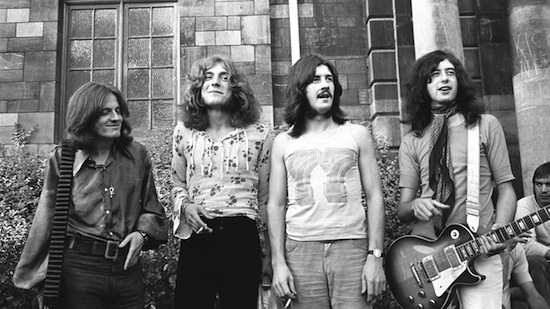The release of Led Zeppelin’s The Complete BBC Sessions would seem to mark an end to a process of curating that the band’s guitarist and producer, Jimmy Page, has been engaged with these past few years. Talking about the album in front of a small audience at Olympic Studios in South London, his response seems to confirm as much when he says, “Maybe now it’s time to dust down the guitar.”
The sessions, recorded between 1969 and 1971, capture a period when a guitar was rarely out of Page’s hands. This was Led Zeppelin at their apex, creating albums of bludgeoning intensity as they unceremoniously scooped out what remained of the psychedelic Sixties and defined it in brash new registers, providing a template for the coming decade that would, in its turn, be used and abused, deified and dumped on, not least by themselves.
Led Zeppelin originally released The BBC Sessions in 1997, and it was Page’s own completist tendencies that evidently prompted this updated version. “After the releases of the studio albums with the companion discs, which gave such a complete, panoramic audio picture of what was being done in the studio, I wanted to tackle this little nutmeg, because we’d left stuff off the album we released nearly twenty years ago.”
As a consequence, The Complete Sessions includes a third disc with eight previously unreleased tracks. One of them is ‘Sunshine Woman’, a blues number only recently discovered via bootleg. Coming from a 1969 broadcast, it was recorded off the radio by a listener in Eastern Europe. “That track was literally made up in the studio, and people were curious as to how come we didn’t record it afterwards,” says Page. “The simple reason is we were creating music so freely, it was sort of just pouring out, and those things were just for that moment before moving on to something else, which was very much Zeppelin’s ethos.”
Most of the recordings on the sessions are taken from albums I-IV, with some additional material in the shape of songs like ‘The Girl I Love She Got Long Black Wavy Hair’, ‘Travelling Riverside Blues’, ‘How Many More Times’ and another new track on the third disc, a 1969 recording of ‘White Summer’ at the Playhouse Theatre.
Listening to these sessions, it’s clear why Led Zeppelin never gave a toss about the single’s market. The confidence, exuberance and “fearlessness” of the performances hits you like a blastwave. “Here’s where you hear the band going full throttle, taking no prisoners,” says Page. At the time it would also have been proof of their reputation as one of the most exhilarating live acts around, a band you really had to see if you wanted to get a sense of how, as Page once put it, they “move the air about the room”. Right from the opening number on the album, ‘You Shook Me’, the sound is huge, highly charged and crackling with energy. Even close to half a century later you still sense it sparkling with all the era’s lysergically-infused ‘isness’.
What frequently comes across in songs like ‘Communication Breakdown’, ‘Whole Lotta Love’ and ‘Immigrant Song’ is a kind of proto punk. Despite the band’s well-documented skewering at the hands of Johnny Rotten et al later in the Seventies, during this early period, Led Zeppelin were themselves reacting to what they perceived as the increasing intellectualisation of beat music. To the rock snobs in the British music press, the band was mostly regarded as a crass, degenerate version of Cream.
It’s a distinction that appears somewhat arbitrary from this distance, although in historical terms the punks’ aversion is easier to grasp. By the mid-to-late Seventies, the band’s energy was increasingly diverted from creating songs into establishing what would become the rock band bildungsroman of cliché; mouths stuffed with gold, nostrils clogged with cocaine, the whole foppish, fin-de-siecle aesthetic curdling into something sleazy, vapid and tragic. Even Plant and Page later acknowledged that someone needed to come along and press the reset button.
But all that was further down the line. While the band was hardly abstaining during the period when the BBC sessions were recorded, the fallout was some way off yet. “John Paul Jones and I had been session musicians,” says Page, “so we were used to going to the BBC and working under controlled conditions where every second is costing money, so we were always very efficient. There was no messing about. We weren’t going to go in there pissed.”
Radio One had only been established by the BBC in 1967, and the idea of groups coming in to do sessions was still a novelty. It meant Led Zeppelin were effectively guinea pigs, and these recordings considered auditions. “We’d done about four sessions before a piece of correspondence came back to say we’d passed the audition,” says Page, smiling. One of the advantages of such novelty, though, was an opportunity to shape the format. “We had the freedom to record what we wanted. There were three or four songs that were recorded on the session and then we started making up numbers as well. It was literally, here’s a riff, one-two-three-four, let’s go.”
The rest of the additional material on The Complete BBC Sessions consists of further live versions of tracks heard on the 1997 release. One could question why anyone needs five versions of ‘Communication Breakdown’, or three versions of tracks like ‘Dazed and Confused’ and ‘You Shook Me’, but you could just as well argue that if fans are going to listen to these songs over and over, why not enjoy some variations? What they can’t fail to reveal is the band’s virtuosity and improvisational skill, that ‘telepathic’ quality in live performances that made them popular enough to become the pioneers stadium rock. It’s a dubious accolade perhaps, given all the cock rock, shock rock and hair rock that was to ride in on the comet’s tail, but then, they can hardly be blamed for that.


